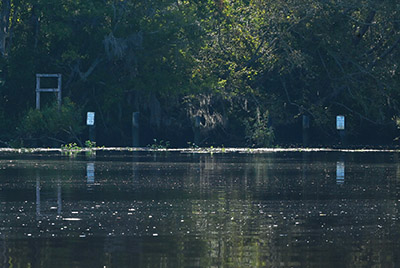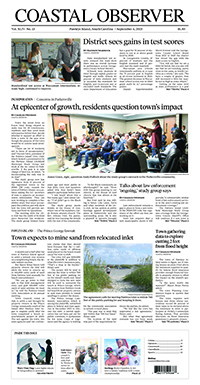Environment
Utility files suit to fund filtering of ‘forever chemicals’ from drinking water

The level of toxic “forever chemicals” in the Waccamaw River is nearly three times the maximum level for drinking water set by the federal government last year.
Georgetown County Water and Sewer District has filed suit against the chemical manufacturers, including 3M and DuPont, and a dozen of their customers in the region seeking compensation for upgrading its treatment plants to remove those chemicals, the additional cost of operating those facilities and for damage to its reputation. It also seeks punitive damages.
The chemicals are per- or poly-fluoroalkyl substances, known generally as PFAS. They are used to create products that are resistant to water and stains, such as fabrics and non-stick cookware.
“Because of their persistence and bioaccumulation, PFAS discharged into the Waccamaw River and its tributaries decades ago are still present in GCWSD’s water supply and continue to impact GCWSD’s ability to provide clean drinking water to its water customers,” according to the suit filed in Circuit Court.
The district first addressed the issue in 2023, when the federal Environmental Protection Agency proposed a “maximum contaminant level” for PFAS that it would enforce for drinking water. At the time, the district estimated that the cost of upgrading its equipment at $23 million. That didn’t include operating costs.
Under the regulations, the district will have to limit the level of two PFAS chemicals to 4 parts per trillion. The state Bureau of Water began testing last year. In the Waccamaw River upstream of the district’s water intake, the level of two of the substances, PFOS and PFOA, averaged 11.2 and 7.6 parts per trillion last year. The suit calls those “the two most notorious PFAS chemicals.”
Studies cited by the EPA, and by the lawsuit, found the effects of PFAS include cancer, liver damage and a reduced immune system. There are also impacts on fetuses and infants whose mothers are exposed to the chemicals.
When the EPA adopted the limits last year, it gave utilities five years to comply.
Tommie Kennedy, the current Georgetown County Water and Sewer District executive director, said part of the cost of compliance is figuring out the best method to use.
“It’s really hard to say an exact number” for the cost, he said.
The suit also seeks punitive damages.
One treatment method, reverse osmosis, is used by the district when saltwater flowing up the river from Winyah Bay affects the supply for the plant at Willbrook. That costs significantly more to operate, Kennedy said.
The Cape Fear Public Utility Authority in Wilmington, N.C., installed granular activated carbon filters at its water treatment plant in 2022. It is on the Cape Fear River and downstream from a Chemours chemical plant that produces PFAS. The process reduced the PFAS level in the drinking water to almost none, according to the utility’s monitoring data.
The system took three years to build at a cost of $35.9 million for a plant that treats up to 35 million gallons of water a day. The treatment plant at Willbook has a capacity of 8 million gallons a day, and the district plans to expand that to 10 million gallons.
PFAS have been around since the 1940s. 3M, the maker of ScotchGuard, and DuPont, the maker of Teflon, started studying the chemicals’ toxicity in the 1950s but “actively hid their findings from regulators and the general public,” according to the suit.
After an EPA investigation, 3M announced it was pulling PFOS from the market in 2000.
Hundreds of lawsuits were filed against 3M and DuPont and its spinoff companies. Those were consolidated in one case in the U.S. District Court in Charleston. In 2023, DuPont and its spinoffs agreed to settle their cases for $1.2 billion. 3M reached a settlement for $10.3 billion to $12.5 billion.
Attorneys approached Georgetown County Water and Sewer about representing the utility in the settlements. It hired the Columbia firm of Richardson Thomas, which brought the suit in state court. The firm also filed a similar suit on behalf of the city of Georgetown which treats water from the Pee Dee River that also contains PFAS from upstream sources.
The water district and the city both opted out of the federal court settlements, according to the suits.
The state suits also names a range of companies in the Pee Dee that used PFAS:
• Burlington Industries, which had a textile mill in Society Hill. It’s now in bankruptcy;
• Clarios, formerly Johnson Controls Battery Group, which has a plant in Pamplico that is now idle;
• Delta Mills, which ran a textile plant in Wallace until 2006;
• Domtar Paper, which has a mill in Bennettsville;
• Elevate Textiles, which operates Burlington;
• Fiber Industries, which has a textile mill in Darlington;
• Galey & Lord Industries, whose textile plant in Society Hill closed in 2016 and is now an EPA Superfund site;
• GFL Environmental, which operates landfills in North Carolina through its subsidiaries;
• J.P. Stevens & Co., which operated a textile mill in Wallace until 1987, when it was sold to Delta Mills, another defendant. The plant is now closed;
• Mohawk Industries, which had a flooring plant in Blenheim that closed in 2022;
• Nan Ya Plastics, which manufactures polyester materials in Lake City;
• PRET Advanced Materials, which produces plastics from new and recycled material at a plant in Johnsonville;
• WestRock, which manufactures paper products at a plant in Pamplico.
The suit claims that PFAS chemicals used at these facilities were discharged into water bodies and made their way downstream to enter the district’s drinking water.
“These ‘forever chemicals’ will continue to pollute GCWSD’s water supply for generations to come and will be present in GCWSD’s drinking water in excess of the applicable federal standards until they are removed through very sophisticated filtration methods,” the suit states.
Kennedy noted that the presence of PFAS doesn’t make the district’s water unsafe.
“There are so many other places you can get PFAS beside drinking water,” he said.
But he said the district is working toward meeting the EPA deadline for compliance. If the lawsuit doesn’t provide the funds to do that, the district would likely borrow the money and then pay it back through an increase in rates to customers, Kennedy said.




